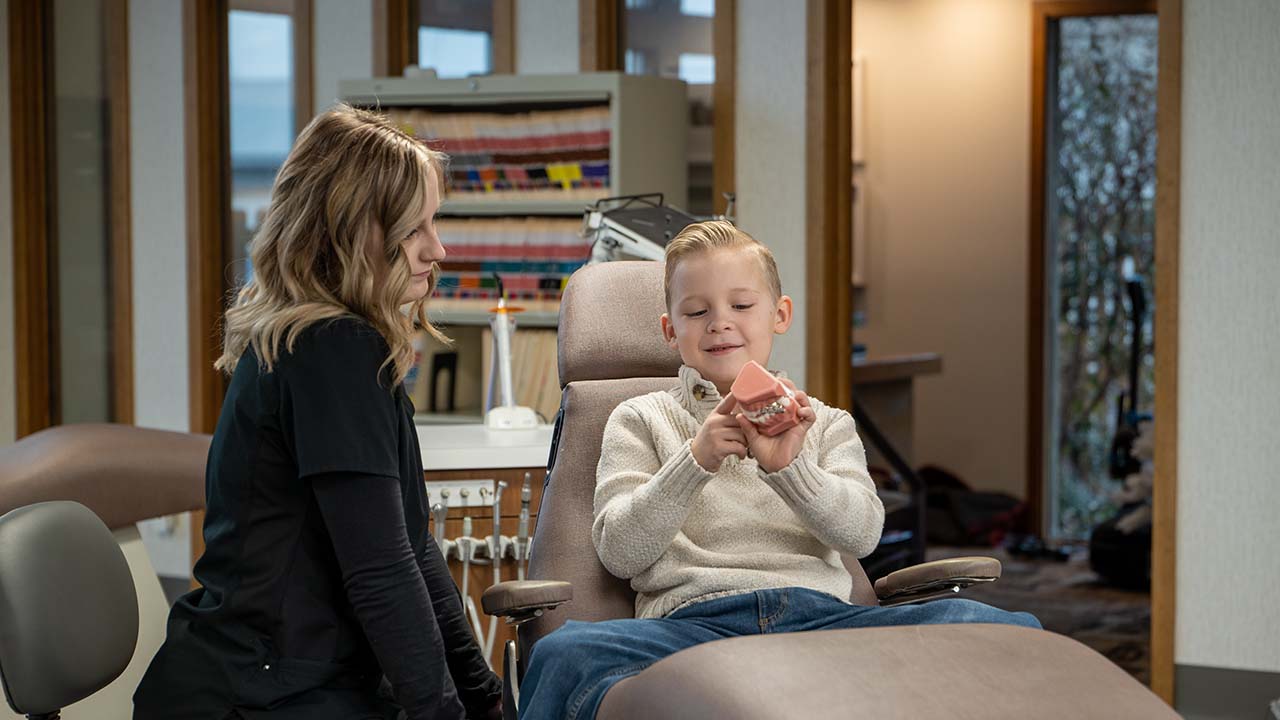
Have questions about orthodontic care? You’ve come to the right place! Our orthodontists in Fort Wayne, Indiana, and surrounding areas would be more than happy to answer your questions so you can feel more confident about your treatment.
If you don’t see your question listed here, please feel free to reach out to one of our offices.
In the meantime, here are the most frequently asked questions we get from patients.
When Should My Child See an Orthodontist?
The recommends that children see an orthodontist at age seven or whenever you first start to notice orthodontic issues. During your child’s consultation, our orthodontists will be able to determine if your child needs braces and when they should start treatment.
Can Adults Get Braces or Aligners?
Yes! In fact, 1 in 4 orthodontic patients is an adult according to the . Parrish Orthodontics offers a range of orthodontic services for adults, including traditional metal braces, clear ceramic braces, and Invisalign® aligners.
How Long Will I Need Braces or Aligners?
Each patient is different. The length of your treatment will ultimately depend on the complexity of your case and how well you comply with our orthodontists’ instructions. For example, it’ll take longer to straighten your teeth if you don’t wear Invisalign aligners 20 to 22 hours per day.
To get a specific timeline for your treatment plan, you’ll need to schedule an appointment with one of our orthodontists.
Do Braces and Aligners Hurt?
It’s normal for your teeth to feel a little sore after we adjust your braces or give you a new set of Invisalign aligners. Braces and aligners work by exerting constant but gentle pressure on your teeth. This guides your teeth into optimal alignment so you can enjoy a straighter, more attractive smile.
How Can I Relieve Pain From Braces or Aligners?
Any discomfort caused by orthodontic treatment usually subsides in three to five days. In the meantime, we recommend eating soft foods and taking an over-the-counter pain reliever like Acetaminophen (Tylenol).
If a bracket is irritating your gums or the inside of your cheeks, you may apply orthodontic wax over the bracket and replace the wax as needed. If you have sore spots in your mouth, rinse with warm saltwater (1 tsp salt + 8 oz warm water).
If you have a poking wire, use a pencil eraser to push it down or place wax over it so it’s no longer irritating the soft tissue. If that doesn’t work, please call our office so we can safely trim the wire for you.
Is It Normal For My Teeth to Feel Loose?
Yes, it’s normal for your teeth to feel a little loose during orthodontic treatment. The braces or aligners apply force to the teeth, which softens the surrounding jawbone. As a result, your teeth may feel a little loose as they move into their final positions. Once you achieve your perfect smile, your body will start to deposit new bone tissue around your teeth.
If your teeth ever feel looser than usual, please don’t hesitate to reach out to one of our offices. We can help you determine if what you’re experiencing is normal or cause for concern.
What Foods Can I Eat With Metal Braces?
Avoid foods that are sticky and/or hard to chew. These foods include gum, popcorn, and uncooked apples. Eating these foods will increase your risk of damaging a wire or bracket.
Can I Still Play Sports During Orthodontic Treatment?
Yes, you may still play sports during orthodontic treatment. But if you play a contact sport, we recommend wearing a mouth guard that’s designed to fit over your braces. This will help protect your teeth if you’re hit in the face. It’ll also prevent your wires or brackets from snagging on soft tissue, which can cause bleeding.
Do I Need to Continue Seeing My Dentist?
Yes, we recommend that you continue seeing your dentist for preventive care. In general, most patients will need a teeth cleaning and oral examination every 6 months. But it’s important to remember that each patient is different. Your dentist will tailor your care around your specific oral health needs. They’ll also help you avoid cavities, gum disease, and other health issues during and after orthodontic treatment.

